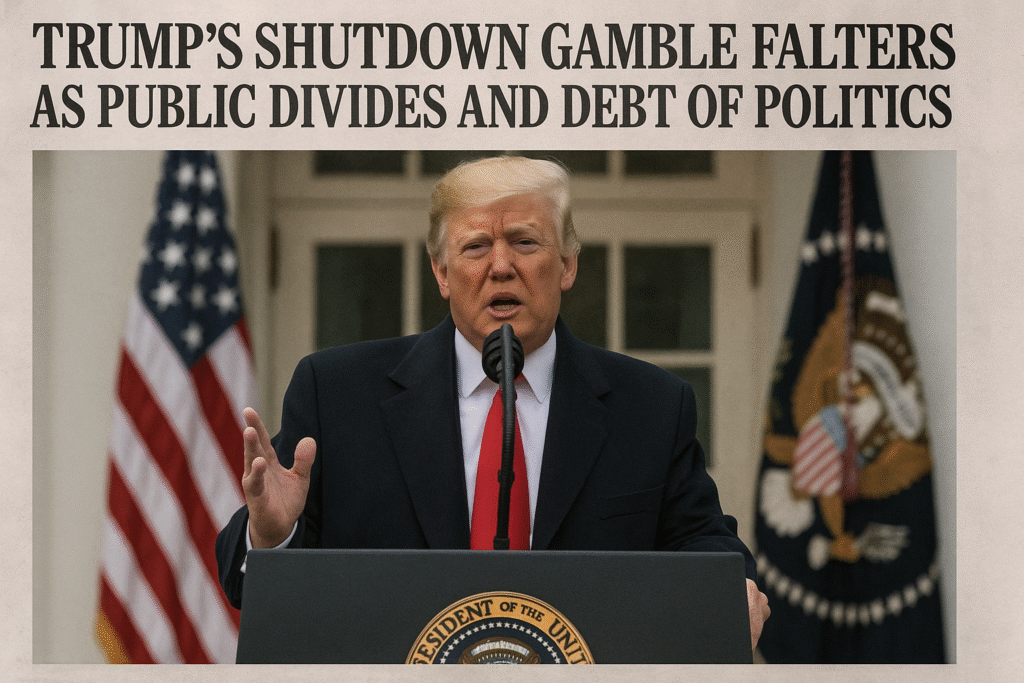By Harshit | October 4, 2025 | Washington, D.C. | 10:30 AM EDT
President Donald Trump had hoped the government shutdown would yield a swift political victory for Republicans. But now, with the stalemate stretching into a second week, that strategy looks increasingly perilous. What began as an assertive show of leverage has evolved into a tangled messaging war, ambiguous polling, and mounting risks for both parties.
Democrats Hold Firm, Voters Split
Contrary to expectations that Democrats would buckle quickly, many have remained unified in insisting that any spending bill include health care funding renewals for low-income Americans. GOP operatives privately admit they misjudged their opposition’s resolve.
Early polling suggests the public is evenly divided over blame. While the White House initially touted data showing majority faulting Democrats, a Washington Post poll released Thursday reported that 47% of respondents blame Trump and Republicans, while 30% point to Democrats.
“This is basically a congressional problem,” said GOP pollster Whit Ayres. “We’ve had shutdowns before — this feels almost routine to many voters.”
Messaging Escalates
With no clear exit in sight, both sides are ramping up narrative warfare. Trump allies are accusing Democrats of shutting down the government to defend health care provisions for undocumented immigrants — a tactic Republicans believe could sway public support.
The White House is also leaning into the optics of fallback: they have threatened mass layoffs, framing them as the inevitable result of Democratic intransigence.
“If this shutdown continues … layoffs are an unfortunate consequence,” Press Secretary Karoline Leavitt said. “It’s the Democrats who forced the president into this position by voting to shut the government down.”
Inside Republican circles, there’s unease. One adviser told reporters:
“I’m supposed to say this is killing the Democrats. But I don’t think it helps either side.”
Stakes for Trump and Republicans
The political conventional wisdom holds that the party triggering a shutdown takes the bulk of blame. But this time, the damage appears more spread out. Voters seem less outraged, more apathetic — a position that benefits neither side.
Markets, too, seem largely unfazed; the day-to-day chaos in Washington has become part of the backdrop rather than a shock to economic confidence.
GOP leaders are doubling down. They continue to call for a “clean” funding bill — one without additional policy riders — and are pushing the narrative that Democrats are obstructing basic governance to force their agenda.
Meanwhile, some Democratic lawmakers are shifting language. With sustained standoff likely, they’re broadening the conversation beyond health care, pushing arguments around fairness, worker protection, and preventing government shutdowns as a recurring tactic.
Real-World Impact
While the political posturing unfolds, many federal services and employees suffer. More than 750,000 federal workers remain furloughed or working without pay. Essential services — including transportation safety, border security, and defense — continue operating, but staff morale is precarious.
Monuments and museums have closed in many cities, though some landmarks like the Statue of Liberty remain open by special budgetary arrangements.
The uncertainty could stretch until Friday, when lawmakers plan another funding vote. But insiders warn that without meaningful concessions from both sides, the shutdown might persist into mid-October or beyond.
The Unclear Road Ahead
Trump aides and congressional Republicans are preparing for a protracted messaging fight. Some predict that, if push comes to shove, Trump will use layoffs as both political weapon and pressure tool, leaning into public impatience to force Democrats’ hand.
But Republicans also risk alienating core constituencies. If essential workers begin calling out sick (as happened in past shutdowns), delays in air travel, security, and public services may become headline crises.
Some Democrats view the shutdown as long overdue leverage to defend health care. They argue that letting Republicans cut benefits for vulnerable Americans is politically and morally untenable.
At this moment, both parties find themselves locked in rhetorical rigidity, each hoping the other will blink first. For now, voters wait — frustrated, critical, and perhaps, in many cases, indifferent.
The question now is whether the shutdown will conclude with a negotiated truce, or if the standoff becomes a prolonged political burden. If Trump’s gamble fails, his legacy may take a harsher judgment than he bargained for.

